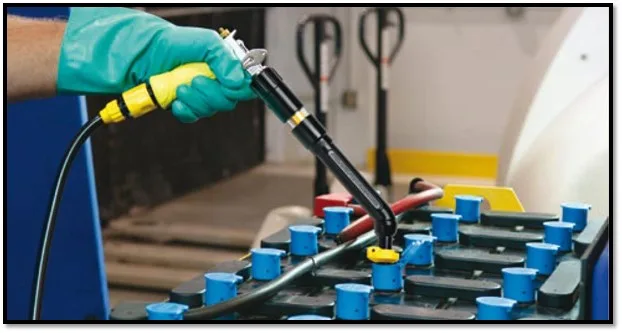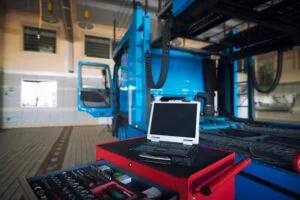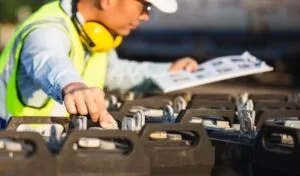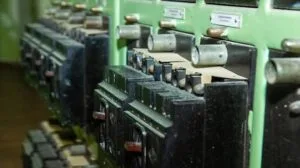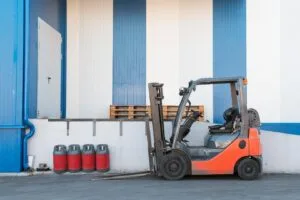Forklifts are a vital part of operations in warehouses, factories, and many other industries. These machines rely on powerful batteries to lift heavy loads, transport materials, and keep your operations running smoothly. But just like any piece of machinery, forklift batteries need regular maintenance to perform at their best.
At Industrial Batteries Accessories Ltd., we understand the importance of keeping your forklift batteries in top condition. However, many businesses make simple mistakes when maintaining their forklift batteries, which can lead to poor performance, higher maintenance costs, and even premature battery failure. This blog will explore common mistakes made in forklift battery maintenance and offer practical solutions to avoid them.
By paying attention to a few key maintenance practices, you can extend the lifespan of your forklift batteries, improve performance, and avoid costly replacements.
Common Mistakes in Forklift Battery Maintenance
1. Overcharging or Undercharging Batteries
One of the most common mistakes forklift operators make is overcharging or undercharging the battery. Both of these can have serious consequences on the health of the battery.
- Overcharging occurs when the battery is left on the charger for too long, causing the battery to overheat. This can reduce the battery’s lifespan and even damage its internal components.
- Undercharging happens when the battery isn’t charged enough, leaving it partially depleted. This can reduce its overall performance and cause the battery to deteriorate faster.
How to Avoid It:
- Use an automatic charger: Automatic chargers are designed to stop charging once the battery reaches full capacity. This prevents overcharging.
- Charge regularly: To avoid undercharging, try to charge your forklift batteries during breaks or whenever the machine isn’t in use. Keeping the battery between 20% and 80% of its capacity will help prevent premature wear.
2. Ignoring Regular Cleaning and Maintenance
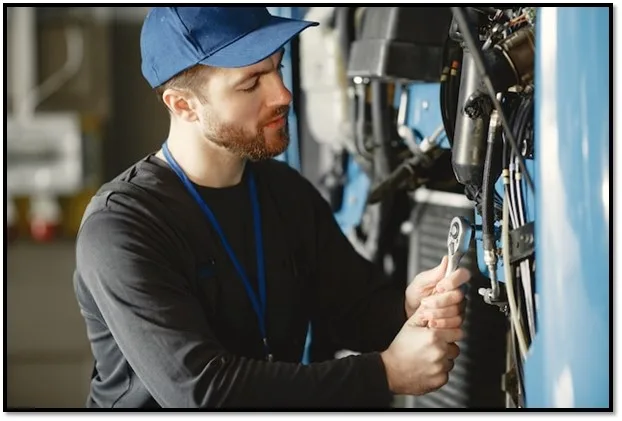
Battery maintenance isn’t just about charging it correctly. It’s also important to clean the battery regularly to prevent dirt and grime from building up. Dirt on the battery terminals can cause poor connections, which results in inefficient charging and loss of power.
Additionally, corrosion can form on battery terminals, causing them to wear out faster. Many forklift users neglect cleaning the battery or fail to check for corrosion, which can lead to operational issues.
How to Avoid It:
- Clean terminals regularly: Check the battery terminals for any corrosion or build-up. Clean the terminals with a solution of baking soda and water if necessary.
- Inspect the battery case: Clean the outer surface of the battery to prevent dirt from entering the system. Keeping the battery dry is essential.
- Use a protective cover: A battery cover helps keep the battery clean and protects it from dirt, moisture, and damage.
3. Neglecting to Check Electrolyte Levels in Lead-Acid Batteries
If your forklift uses a lead-acid battery, maintaining the correct electrolyte level is crucial for battery performance. Low electrolyte levels can lead to overheating and permanent damage. Neglecting this simple maintenance task is a big mistake that can shorten the battery’s lifespan.
How to Avoid It:
- Check electrolyte levels regularly: Ensure the battery’s electrolyte is always at the proper level. For lead-acid batteries, the liquid should cover the plates inside the cells. If the level is too low, add distilled water to top it up.
- Avoid overfilling: When adding water, ensure not to overfill the battery. Overfilling can cause the electrolyte to spill, leading to damage and potential hazards.
4. Charging During Extreme Temperatures
Temperature plays a big role in battery performance. Charging forklift batteries in extreme temperatures—either too hot or too cold—can lead to poor battery performance and shorten its life.
- Charging in extreme heat can cause the battery to overheat, leading to the breakdown of the internal components.
- Charging in extreme cold can lead to longer charging times and may not allow the battery to charge fully.
How to Avoid It:
- Charge in moderate temperatures: The best temperature for charging forklift batteries is between 50°F and 80°F (10°C and 27°C). Make sure to charge batteries in a temperature-controlled environment.
- Allow the battery to cool down: If your forklift has been working in hot conditions, let the battery cool down before charging it. Charging a hot battery can cause thermal runaway and damage the cells.
5. Not Performing Regular Battery Inspections
Neglecting to regularly inspect forklift batteries can lead to undetected issues that cause costly repairs down the line. Even a small issue, like a loose terminal or a slight crack in the battery case, can lead to major problems if not addressed in time.
How to Avoid It:
- Inspect regularly: Conduct visual checks on the forklift battery at least once a week. Look for signs of leaks, cracks, corrosion, or any other visible damage.
- Test the battery: Use a voltmeter or a battery tester to check the battery’s charge and ensure it is functioning properly.
The Importance of Forklift Battery Regular Maintenance
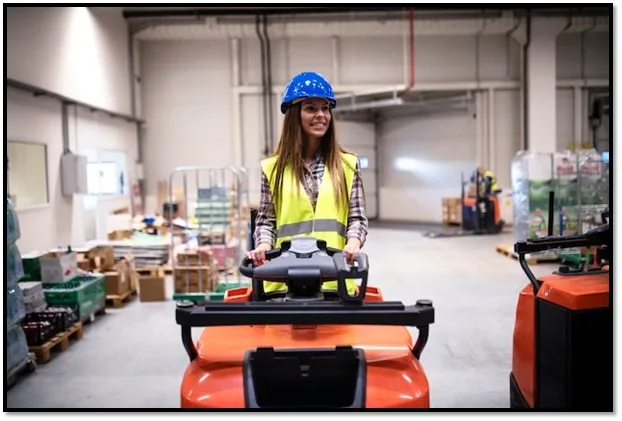
Proper forklift battery maintenance doesn’t just improve the performance and lifespan of your battery; it also helps improve the efficiency of your entire operation. Here are some of the top benefits of regular forklift battery maintenance:
- Longer Battery Life: Regular maintenance can extend the life of your battery, saving you money on replacements. This also ensures your forklifts operate at peak performance for a longer period.
- Improved Productivity: Properly maintained batteries provide consistent performance. This means fewer interruptions during your workday and more uptime for your forklifts.
- Safer Operations: Regular battery maintenance helps prevent accidents caused by battery failure, such as leaks or electrical fires.
- Cost Savings: Preventing issues before they arise can save money on costly repairs and replacements. You’ll also avoid costly downtime, which can have a significant impact on your operations.
Forklift Battery Regular Maintenance: Best Practices
To maintain your forklift batteries and keep them in top condition, follow these best practices:
- Create a maintenance schedule: Set up a regular maintenance schedule for your forklifts. This can include cleaning, inspecting, and charging your batteries properly.
- Train your team: Make sure your forklift operators and maintenance staff are trained to perform proper battery maintenance. Educate them on the signs of battery wear and the steps to take to extend battery life.
- Use quality batteries and chargers: Always use high-quality forklift batteries and chargers. Cheap or subpar products can lead to poor performance and frequent breakdowns.
- Monitor battery performance: Keep track of your forklift batteries’ performance over time. Look for any changes in run-time, charging time, or signs of wear. Monitoring performance can help you catch issues early.
Lead-Acid vs. Lithium-Ion Forklift Batteries
| Feature | Lead-Acid Batteries | Lithium-Ion Batteries |
| Lifespan | 3-5 years | 5-10 years |
| Maintenance | Regular maintenance required | Minimal maintenance required |
| Charging Time | 6-8 hours | 1-2 hours |
| Cost | Lower initial cost | Higher initial cost |
| Efficiency | Less energy-efficient | More energy-efficient |
| Temperature Sensitivity | Sensitive to extreme temperatures | Performs well in a wider range |
Frequently Asked Questions (FAQs)
Q1: How often should forklift batteries be maintained?
Forklift batteries should be inspected and maintained at least once a week. You should also clean the terminals and check the electrolyte levels in lead-acid batteries regularly.
Q2: Can I extend the life of my forklift battery?
Yes! Regular maintenance, charging at the right times, and ensuring proper storage conditions can all extend the lifespan of your forklift battery.
Q3: What is the best way to charge a forklift battery?
The best way to charge a forklift battery is to avoid overcharging or undercharging it. Charge it when it’s about 20-30% discharged, and avoid leaving it on the charger for too long.
Q4: Are lithium-ion forklift batteries better than lead-acid batteries?
Lithium-ion batteries tend to last longer, charge faster, and require less maintenance compared to lead-acid batteries, though they do come at a higher initial cost.
Conclusion
Forklift battery regular maintenance is essential for ensuring that your forklift batteries perform efficiently and last as long as possible. By avoiding common mistakes like overcharging, neglecting cleaning, and failing to check electrolyte levels, you can keep your forklift batteries in good shape and prevent costly replacements. With proper care and attention, your forklift batteries will run smoothly, improving your operations and boosting your bottom line.
At Industrial Batteries Accessories Ltd., we are committed to providing high-quality forklift batteries and charging solutions to help you keep your fleet running smoothly. Reach out to us for all your forklift battery needs!

